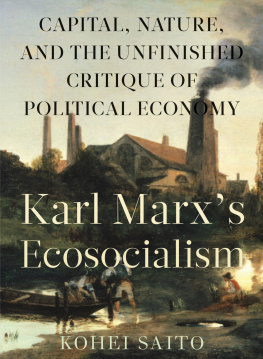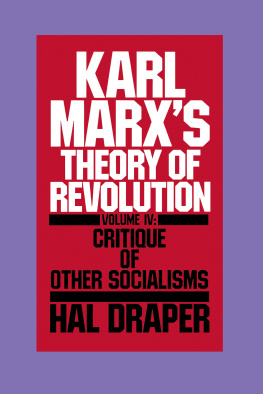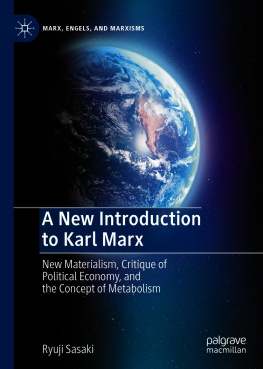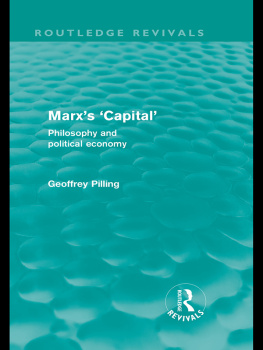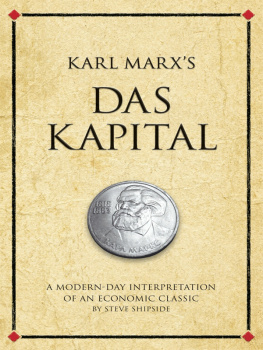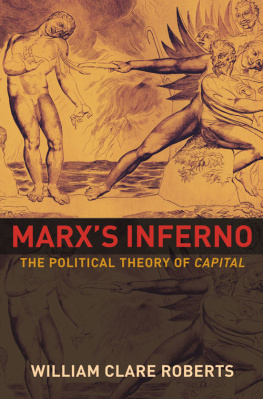Copyright 2017 by Kohei Saito
All Rights Reserved
Library of Congress Cataloging-in-Publication Data
available from the publisher.
ISBN (paper) 978-1-58367-640-0
ISBN (cloth) 978-1-58367-641-7
MONTHLY REVIEW PRESS
NEW YORK, NEW YORK
monthlyreview.org
Typeset in Minion Pro
5 4 3 2 1
Acknowledgments
T his book is an English version of Natur gegen Kapital: Marx kologie in seiner unvollendeten Kritik des Kapitalismus (Frankfurt am Main: Campus, 2016), which was based on my dissertation. In that German edition, I thanked Andreas Arndt, who, as my supervisor, always motivated and inspired me in Berlin, and my Japanese colleagues Shigeru Iwasa, Teinosuke Otani, Tomonaga Tairako, Ryuji Sasaki, Hideto Akashi, and Soichiro Sumida for their comments and constructive criticisms throughout the project. I was also grateful to the MEGA editors in the Berlin Brandenburg Academy of Sciences (BBAW), notably Gerald Hubmann, Claudia Reichel, and Timm Gramann, who encouraged me to struggle with Marxs notebooks. Thanks also to Frieder Otto Wolf, Harald Bluhm, Michael Heinrich, Michael Perelman, Ingo Sttzle, Kolja Lindner, and Elena Louisa Lange for their helpful comments in various conferences.
Preparing the English manuscript, I was lucky to receive additional help. First of all, I want to thank Kevin Anderson who kindly hosted me as a visiting scholar in the department of sociology at the University of California, Santa Barbara. He provided me with opportunities to share my research with the members of the department as well as the International Humanist Marxist Organization in Los Angeles. I cannot thank John Bellamy Foster enough. He has been very supportive, publishing my articles in Monthly Review and publishing this book with Monthly Review Press. At each stage of the project, his comments and editing always improved the clarity and preciseness of the writing. I also cannot give adequate thanks to Brett Clark, who read my first English draft and significantly improved it with his careful and accurate reading. Thanks to his help, it became possible to convey my interpretation in a foreign language, although any remaining errors must of course be attributed to me. I am also grateful to Michael Yates from Monthly Review Press, who together with its editorial committee offered an unknown Japanese scholar this wonderful opportunity to publish my first English book. Finally, I would like to thank Martin Paddio at Monthly Review Press, and copy editor Erin Clermont, for their hard work during the publication process.
The Japan Society for the Promotion of Science financed my research at the University of California, Santa Barbara, enabling me to complete this book.
Introduction
F or quite a long time, the expression Marxs ecology was regarded as oxymoronic. Not just critics of Marx but even many self-proclaimed Marxists believed that Marx presupposed unlimited economic and technological developments as a natural law of history and propagated the absolute mastery of nature, both of which run counter to any serious theoretical and practical consideration of ecological issues such as the scarcity of natural resources and the overloading of ecospheres. Since the 1970s, when grave environmental threats to human civilization gradually but undoubtedly became more discernible in Western societies, Marx was repeatedly criticized by new environmental studies and an emerging environmental movement for his nave acceptance of the common nineteenth-century idea advocating the complete human domination of nature. According to critics, such a belief inevitably led him to neglect the destructive character that is immanent in the modern industry and technology that accompanies mass production and consumption. In this vein, John Passmore went so far as to write that nothing could be more ecologically damaging than the Hegelian-Marxist doctrine.
In subsequent years, the critique against Marxs Prometheanism, or hyperindustrialism, according to which unlimited technological development under capitalism allows humans to arbitrarily manipulate external nature, became a popular stereotype.
This particular critique, which was common in the Anglo-Saxon world, remains widely accepted in Germany, Marxs homeland. Even in recent years, Thomas Petersen and Malte Faber repeated the widespread critique against Marxs productivism, albeit without much textual analysis. According to these German scholars, Marx was too optimistic in terms of his supposition that any production process can be arranged in such a manner that it does not incur any environmentally harmful materials. This optimism of progress is certainly due to his great respect for the capitalist bourgeoisie, which is already documented in the Manifesto of the Communist Party.
The current state of German debates over Marxs ecology surely gives an impression of outdatedness to English readers, who are more familiar with the development of Marxist ecology in the last fifteen years, initiated by two important works: Paul Burketts Marx and Nature and John Bellamy Fosters Marxs Ecology.
As Foster recounts recent developments with respect to socialist environmental thought in his introduction to the new edition of Burketts Marx and Nature, the discursive constellation around Marxs ecology has significantly changed with a series of publications by Marxists inspired by Foster and Burkett. These analyze environmental crises as a contradiction of capitalism based upon the metabolic rift approach: A decade and a half ago the contribution of Marx and Marxism to the understanding of ecology was seen in almost entirely negative terms, even by many self-styled ecosocialists. Today Marxs understanding of the ecological problem is being studied in universities worldwide and is inspiring ecological actions around the globe. The significance of Marxs ecology is now positively recognized on both theoretical and practical levels, to the point that allegations of Marxs Prometheanism are now generally regarded as having been proven false.
However, despite or precisely because of the increasing hegemonic influence of the classical Marxist tradition represented by second-stage ecosocialists such as Foster and Burkett in the environmental movement, there remains the persistent reservation toward accepting Marxs ecology among the so-called first-stage ecosocialists, such as Ted Benton, Andr Gorz, Michael Lwy, James OConnor, and Alain Lipietz. Critics of the theory of metabolic rift complain that Marxs ecology as such can at best point out the banal fact that capitalism is bad for the environment.
In order to refute such persistent misunderstandings of Marxs ecology and to demonstrate its larger theoretical significance, this book aims at a more systematic and complete reconstruction of Marxs ecological critique of capitalism. Although Foster and Burkett have carefully examined various texts by Marx for the purpose of demonstrating the power of his ecological theory, their analyses sometimes give a false impression that Marx did not deal with the topic in a systematic but only in a sporadic and marginal way. On the one hand, it is thus necessary to reveal the immanent systematic character of Marxs ecology, that there is a clear continuity with his critique of political economy. This constitutes the main task of I offer a more complete examination of Marxs ecology than the earlier literature, scrutinizing his natural science notebooks that will be published for the first time in the new

